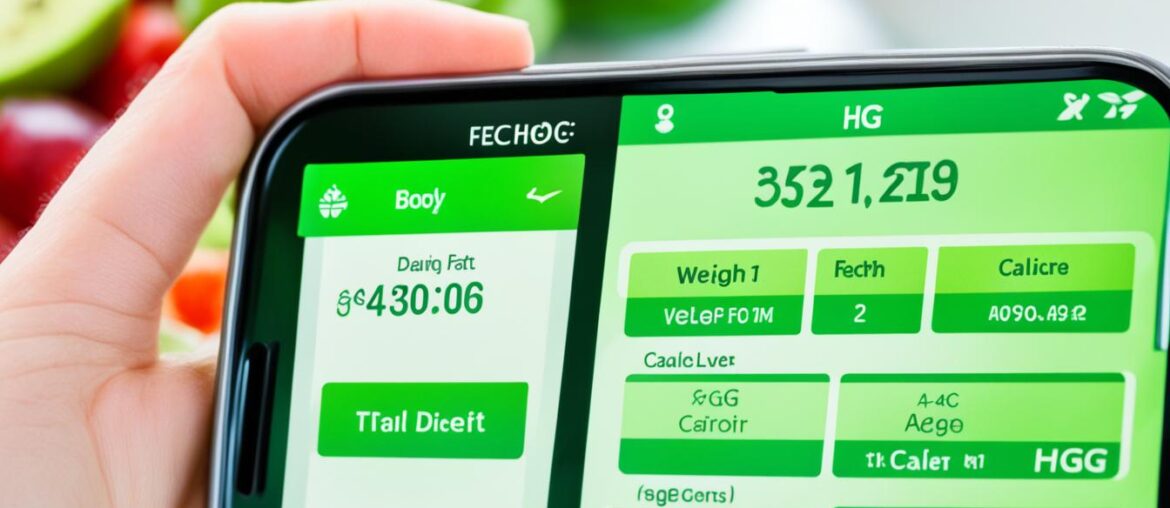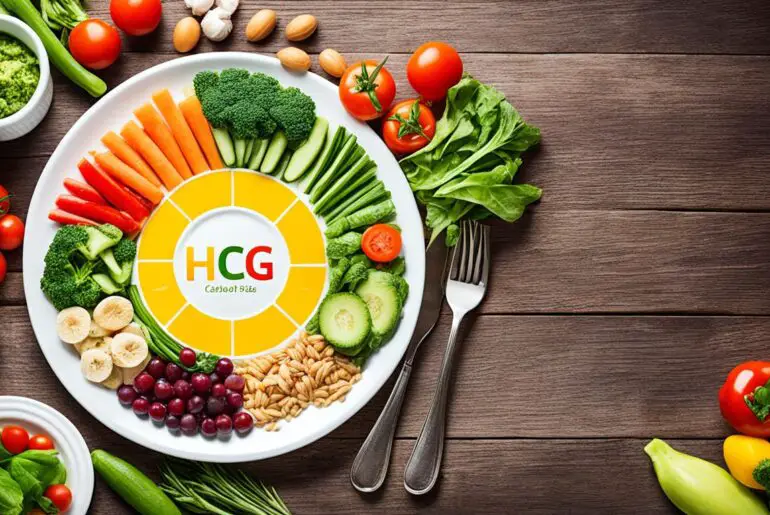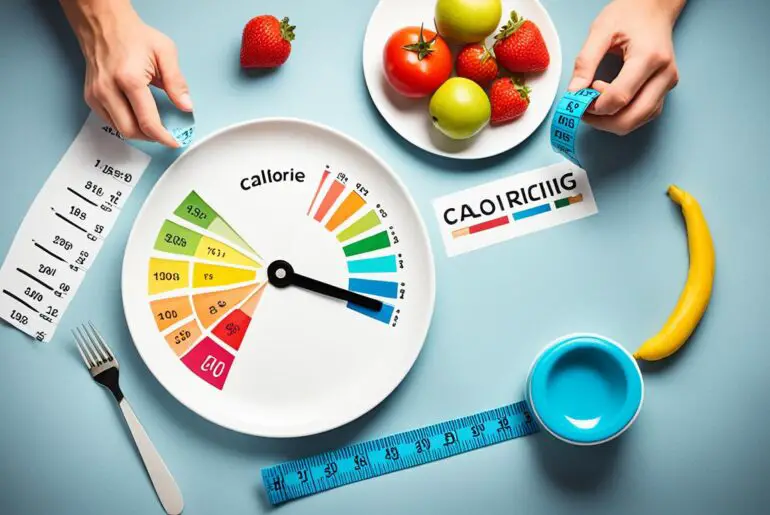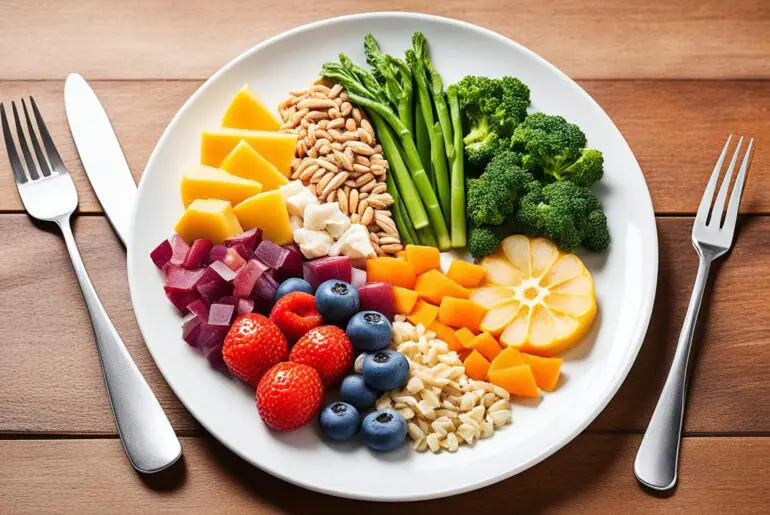Are you considering the HCG diet for weight loss? Before you embark on this journey, it’s crucial to understand the daily caloric needs for HCG weight loss and the potential impact on your health. The HCG diet, known for its severe calorie restriction, has gained popularity as a quick fix for shedding pounds. But is drastically reducing your calorie intake the key to successful weight loss? Let’s explore the facts and find out if this approach is truly effective.
Key Takeaways:
- The HCG diet recommends severe calorie restriction, typically between 500 to 800 calories per day.
- The FDA advises against using over-the-counter HCG products for weight loss due to potential risks.
- The HCG diet may lead to short-term weight loss, but it can also cause nutrient deficiencies and other health complications.
- Safe and effective weight loss methods focus on adopting a balanced diet and regular exercise.
- Consult with a healthcare professional before starting any weight loss program for personalized guidance.
Is the HCG diet safe and effective?
When considering weight loss options, it’s important to evaluate the safety and effectiveness of different diets. The HCG diet, which involves severe calorie restriction and the use of supplemental HCG injections, has garnered attention. However, it is essential to examine the potential risks and side effects associated with this diet to make an informed decision.
Risks of the HCG Diet:
- Nutrient deficiencies: Severe calorie restriction can lead to inadequate intake of essential nutrients, increasing the risk of deficiencies.
- Gallstone formation: Rapid weight loss from the HCG diet may increase the likelihood of developing gallstones.
- Irregular heartbeat: Very low-calorie diets, such as the HCG diet, can disrupt the normal rhythm of the heart.
- Electrolyte imbalances: Imbalances in electrolytes, such as sodium and potassium, can occur due to the limited variety of foods allowed on the HCG diet.
Side Effects of the HCG Diet:
- Fatigue: The low-calorie intake may lead to feelings of fatigue and low energy levels.
- Irritability: Some individuals on the HCG diet may experience mood swings and irritability.
- Depression: The severe restrictions and potential nutrient deficiencies can contribute to feelings of sadness or depression.
- Fluid buildup: In some cases, fluid retention may occur as a result of the HCG diet.
- Blood clot formation: The restricted calorie intake and potential dehydration may increase the risk of blood clot formation.
Considering these risks and side effects, it is crucial to weigh the potential benefits against the possible negative outcomes. Safer weight loss methods, such as a balanced diet and regular exercise, are recommended by healthcare professionals for long-term success and overall well-being.
| HCG Diet | Alternative Weight Loss Methods | |
|---|---|---|
| Effectiveness | Not scientifically proven. | Evidence-based approaches for weight loss. |
| Safety | Risks and side effects associated with severe calorie restriction and limited food choices. | Emphasize a balanced diet and regular exercise to promote overall health. |
| Long-Term Results | Unsustainable and potentially harmful for long-term weight loss maintenance. | Focus on healthy lifestyle changes for maintaining weight loss. |
It is crucial to prioritize safety and choose weight loss methods that promote overall health and sustainability. Consulting with a healthcare professional can provide personalized guidance and support in achieving weight loss goals.
How does the HCG diet work?

The HCG diet is a weight loss regimen that combines a very low-calorie diet with supplemental HCG injections. The diet typically involves restricting daily calorie intake to a range of 500 to 800 calories per day. Supporters of the HCG diet believe that the HCG hormone, which is naturally produced during pregnancy, can stimulate weight loss and fat burning. However, there is a lack of scientific evidence to support these claims, and the Food and Drug Administration (FDA) has not approved the use of HCG for weight loss.
While some individuals may experience weight loss while following the HCG diet, the primary reason for this is the severe calorie restriction rather than the HCG hormone itself. The low-calorie intake forces the body to rely on its fat stores for energy, leading to weight loss. However, it’s important to note that this calorie restriction can result in nutrient deficiencies and may have potential risks.
The use of supplemental HCG injections in the HCG diet is controversial, as there is limited scientific evidence to support their effectiveness for weight loss. The FDA has warned against using over-the-counter HCG products for weight loss, as they are not approved and can pose risks to health.
“The HCG diet involves severe calorie restriction combined with HCG injections, but there is limited scientific evidence to support its effectiveness for weight loss.” – [Author Name]
What can you eat on the HCG diet?
The HCG diet is known for its strict food restrictions and limited calorie intake. When following the HCG diet, you can expect two meals per day, each consisting of specific food groups. These food choices are designed to support the low-calorie nature of the diet and promote weight loss.
Here is an overview of the allowed food choices on the HCG diet:
| Food Group | Allowed Choices |
|---|---|
| Proteins | Lean proteins such as beef, chicken, and fish |
| Vegetables | Non-starchy vegetables like spinach, mushrooms, and cucumbers |
| Bread | One breadstick or one piece of melba toast |
| Fruits | Fruits like oranges, apples, and berries |
It’s important to note that the HCG diet excludes high-fat foods, oils, and butter. This means that fatty cuts of meat, fried foods, and foods cooked in oil are not allowed on the diet. The emphasis is on lean proteins, non-starchy vegetables, and low-calorie fruits.
While the HCG diet provides specific food choices, it’s essential to understand that the calorie intake is severely restricted. This restrictive eating plan may not provide sufficient nutrients and can potentially lead to nutrient deficiencies if followed for an extended period. It’s crucial to consult with a healthcare professional before starting any dietary regimen, including the HCG diet, to ensure it aligns with your individual nutritional needs.
Is the HCG diet recommended for vegetarians or vegans?
The HCG diet may not be suitable for vegetarians or vegans due to its heavy reliance on animal protein sources. The diet recommends lean meats like beef, chicken, and fish, which are not compatible with a vegetarian or vegan diet.
However, the creators of the HCG diet suggest that vegetarians can consume extra skim milk to compensate for the lack of protein from meat. It’s important to note that this modification still would not make the diet suitable for vegans, as it does not provide plant-based protein options.
If you are a vegetarian or vegan considering the HCG diet, it is crucial to consult with a healthcare professional before starting, as it may not meet your nutritional needs. They can provide guidance on adapting the diet to ensure you receive adequate protein and nutrients.
Plant-Based Options on the HCG diet
While the HCG diet primarily focuses on animal protein sources, there are limited plant-based options available. These options may provide some flexibility for vegetarians who are not strict vegans. Here are a few plant-based foods that can be considered:
“Even though the HCG diet is not designed for vegetarians or vegans, there are some plant-based foods that can be included.”
| Food Group | Plant-Based Options |
|---|---|
| Proteins | Quinoa, tofu, tempeh, lentils, beans, peas |
| Vegetables | Broccoli, cauliflower, spinach, kale, zucchini |
| Fruits | Apple, orange, strawberries, blueberries |
| Breads | Gluten-free options like rice cakes or corn tortillas* |
*It’s important to note that gluten-free options are recommended for individuals with gluten intolerance or celiac disease.
While these plant-based options provide some variety, it’s crucial to work with a healthcare professional or dietitian who can help tailor the diet to ensure proper nutrient intake. They can provide guidance on portion sizes, meal planning, and supplementation to meet your dietary needs while adhering to the principles of the HCG diet.
Is the HCG diet gluten-free?
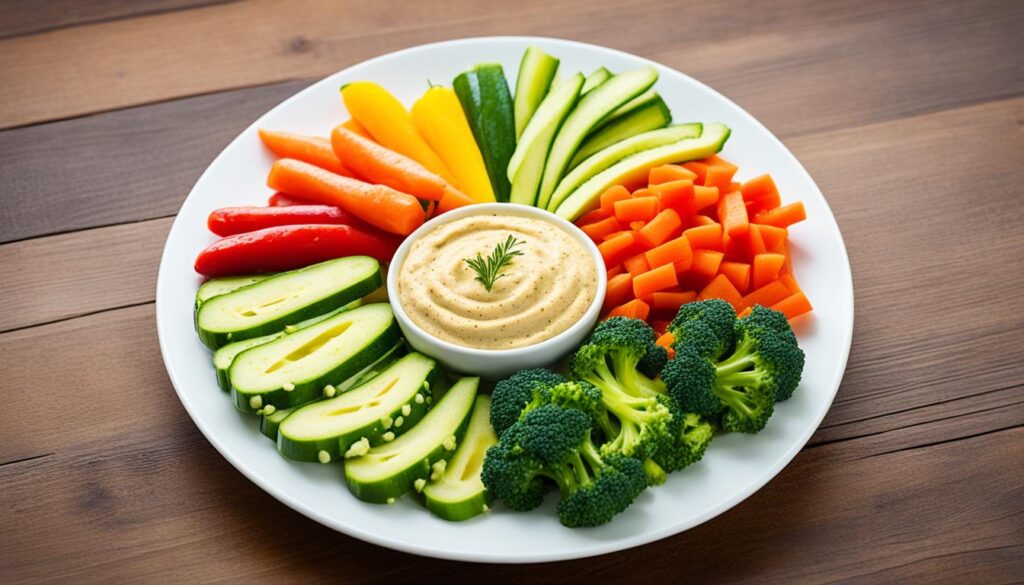
The HCG diet is not specifically gluten-free, as it allows for one breadstick or one piece of melba toast as part of the meal plan. These bread options may contain gluten, which can be problematic for individuals with gluten intolerance or celiac disease. It’s important for those following a gluten-free diet to consider alternatives or modifications to the HCG diet to ensure compliance with their dietary restrictions.
Gluten-Free Alternatives
For individuals following a gluten-free diet and considering the HCG diet, there are a few alternatives to traditional bread options:
- Gluten-free breadsticks: Look for gluten-free breadstick options available in specialty stores or online. These can be used as a substitute for the regular breadstick allowed on the HCG diet.
- Gluten-free crackers: Opt for gluten-free crackers made from alternative grains such as rice, quinoa, or buckwheat. These can replace the melba toast typically included in the HCG diet.
- Vegetable alternatives: Instead of bread products, consider adding extra servings of non-starchy vegetables to your meals. Vegetables like lettuce wraps, cucumber slices, or roasted zucchini can provide a satisfying texture and crunch while remaining gluten-free.
It’s crucial to check ingredient labels carefully to ensure that any gluten-free alternatives you choose are suitable for your specific dietary needs.
HCG Diet and Gluten Sensitivity
Individuals with gluten sensitivity or celiac disease should exercise caution when considering the HCG diet. While the diet itself is not specifically designed to be gluten-free, it may be possible to modify the meal plan to accommodate dietary restrictions. Consulting with a healthcare professional or registered dietitian experienced in working with gluten-free diets can provide valuable guidance and ensure that your nutritional needs are met while following the HCG diet.
Is the HCG diet a form of intermittent fasting?
While the HCG diet and intermittent fasting do involve reduced calorie intake, they are not the same. Intermittent fasting is a dietary pattern that involves alternating periods of eating and fasting, while the HCG diet restricts calorie intake throughout the day. Although there may be some similarities in terms of reduced eating windows, it’s important to differentiate between the two approaches when considering weight loss methods.
“Intermittent fasting involves alternating periods of eating and fasting, while the HCG diet restricts calorie intake throughout the day.”
Intermittent fasting offers a more flexible approach to calorie restriction, allowing individuals to choose from different fasting protocols like the 16/8 method or the 5:2 diet. These methods alternate between periods of regular eating and periods of fasting, often extending for several hours or days.
The HCG diet, on the other hand, focuses on severely restricting calorie intake to as low as 500-800 calories per day. This is achieved by combining the low-calorie diet with supplemental HCG injections.
While both the HCG diet and intermittent fasting may result in weight loss, there are notable differences in terms of their mechanisms and adherence. Intermittent fasting has been associated with various health benefits, including improved insulin sensitivity, increased fat burning, and reduced inflammation. It can be a sustainable long-term approach to weight management for some individuals.
On the other hand, the HCG diet’s restrictive nature and limited food choices make it challenging to follow long-term. Additionally, the safety and effectiveness of the HCG diet for weight loss have not been scientifically established. The HCG hormone itself, typically administered through injections, is not approved by the FDA for weight loss purposes.
It’s important to consult with a healthcare professional before starting any weight loss program. They can provide guidance on the most appropriate and sustainable approach based on individual needs and goals.
The risks and side effects of the HCG diet
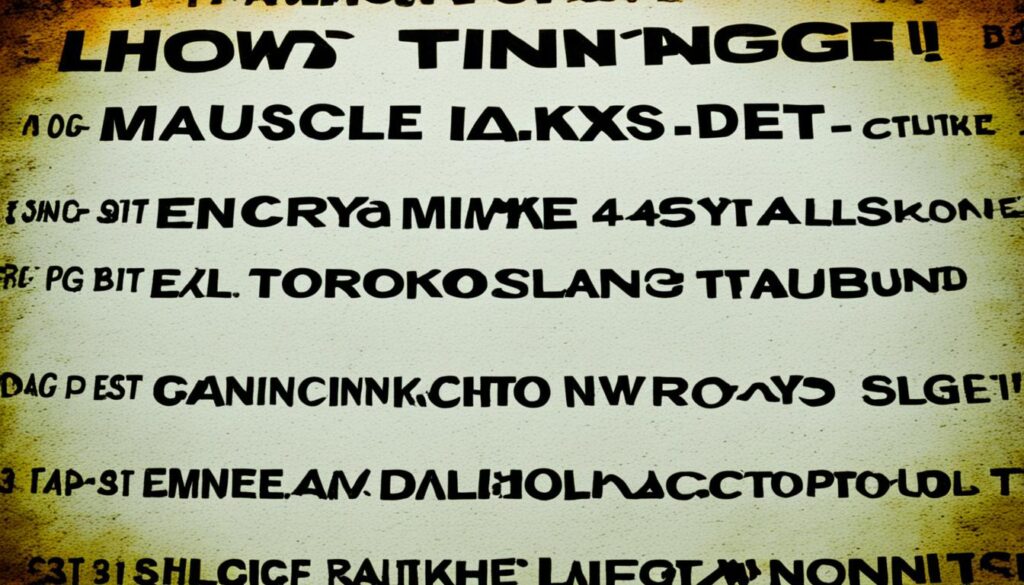
The HCG diet is associated with several risks and side effects due to its severe calorie restriction and limited food choices. It is crucial to be aware of these potential dangers before considering the HCG diet for weight loss.
Risks of the HCG diet:
- Nutrient deficiencies: The extremely low-calorie intake of the HCG diet may result in inadequate nutrients, leading to deficiencies in vitamins, minerals, and essential fatty acids.
- Gallstone formation: Rapid weight loss can increase the risk of gallstone formation, which can cause pain and other complications.
- Irregular heartbeat: The HCG diet’s severe calorie restriction may disrupt the normal rhythm of the heart, causing irregular heartbeat or arrhythmia.
- Electrolyte imbalances: Low-calorie intake can disrupt the balance of electrolytes in the body, leading to muscle weakness, fatigue, and other complications.
Side effects of the HCG diet:
- Fatigue: The extremely low-calorie intake can cause fatigue and lack of energy.
- Irritability: Some people may experience irritability and mood swings while following the HCG diet.
- Depression: The restrictive nature of the diet and the challenges it presents can contribute to feelings of depression or low mood.
- Fluid buildup: In some cases, the HCG diet may lead to fluid retention and swelling in the body.
- Blood clot formation: There have been reports of blood clot formation associated with the HCG diet, which can be a serious and potentially life-threatening complication.
It’s important to note that serious adverse reactions have also been reported with the HCG diet, including pulmonary embolism and cardiac arrest. These risks and side effects highlight the potential dangers of the HCG diet and should be carefully considered before embarking on this weight loss plan.
The importance of sustainable weight loss methods

When it comes to achieving and maintaining a healthy weight, it’s crucial to focus on sustainable weight loss methods. While the HCG diet may offer short-term weight loss results, its severe calorie restriction and limited food choices make it an unsuitable option for long-term weight management.
Healthy weight loss methods involve adopting a balanced diet that provides all essential nutrients while creating a calorie deficit. This can be achieved by incorporating whole foods, such as fruits, vegetables, lean proteins, whole grains, and healthy fats, into your meals.
Furthermore, sustainable weight loss requires regular physical activity. Engaging in aerobic exercises, strength training, and other forms of physical activity not only helps burn calories but also improves overall fitness and boosts metabolism.
Seeking guidance from healthcare professionals is essential for developing an individualized weight loss plan that meets your specific needs and goals.
By focusing on healthy and sustainable weight loss methods, you can achieve long-term success and maintain a healthy weight. These methods prioritize overall health and well-being, ensuring that you not only lose weight but also improve your overall quality of life.
Comparison of Weight Loss Methods
| Weight Loss Method | Benefits | Considerations |
|---|---|---|
| HCG diet | – Short-term weight loss – Quick results |
– Severe calorie restriction – Limited food choices – Potential risks and side effects |
| Healthy and sustainable weight loss | – Long-term weight management – Improved overall health – Sustainable lifestyle changes |
– Requires patience and consistency – May take longer to see results |
When it comes to weight management, it’s important to prioritize your health and well-being. Rather than opting for restrictive and potentially risky methods like the HCG diet, focus on healthy and sustainable approaches that promote long-term success and overall health.
Conclusion
The HCG diet, with its severe calorie restriction and use of supplemental HCG injections, lacks scientific evidence to support its safety and effectiveness for weight loss. The FDA does not approve the use of HCG for weight loss, highlighting potential risks and side effects associated with this diet. It is crucial to prioritize safer and more sustainable weight loss methods, such as adopting a balanced diet and incorporating regular exercise into one’s lifestyle.
While the HCG diet may result in short-term weight loss, the restrictive nature of the diet raises concerns about nutrient deficiencies, gallstone formation, irregular heartbeats, and electrolyte imbalances. Moreover, side effects associated with the HCG diet include fatigue, irritability, depression, fluid buildup, and blood clot formation. Serious adverse reactions like pulmonary embolism and cardiac arrest have also been reported.
To achieve long-term weight management and overall health, it is advisable to follow healthy and evidence-based weight loss strategies. Consulting with a healthcare professional before embarking on any weight loss program is essential to ensure personalized guidance and safe approaches tailored to individual needs and goals.
FAQ
Is the HCG diet safe and effective?
The HCG diet has not been proven to be safe or effective for weight loss. Severe calorie restriction, as recommended in the HCG diet, can lead to risks such as nutrient deficiencies, gallstone formation, irregular heartbeat, and electrolyte imbalances. Side effects of the HCG diet may include fatigue, irritability, depression, fluid buildup, and blood clot formation. Safer weight loss methods, such as a balanced diet and regular exercise, should be considered.
How does the HCG diet work?
The HCG diet involves a very low-calorie diet, typically ranging from 500 to 800 calories per day, along with supplemental HCG injections. The HCG hormone, which is naturally produced during pregnancy, is believed by some to stimulate weight loss and fat burning. However, scientific evidence does not support these claims, and the FDA has not approved the use of HCG for weight loss. The restrictive nature of the diet and the low-calorie intake are primarily responsible for the weight loss observed in individuals following the HCG diet.
What can you eat on the HCG diet?
The HCG diet restricts food choices and limits calorie intake. The diet typically allows two meals per day, consisting of one protein, one vegetable, one bread, and one fruit. Lean proteins such as beef, chicken, and fish are permitted, along with non-starchy vegetables like spinach, mushrooms, and cucumbers. Fruits like oranges, apples, and berries can also be consumed. The diet excludes high-fat foods, oils, and butter. It’s important to note that this restrictive eating plan may not provide sufficient nutrients and can lead to deficiencies if followed for an extended period.
Is the HCG diet recommended for vegetarians or vegans?
The HCG diet may not be suitable for vegetarians or vegans due to its heavy reliance on animal protein sources. The diet recommends lean meats like beef, chicken, and fish, which are not compatible with a vegetarian or vegan diet. The creators of the HCG diet suggest that vegetarians can consume extra skim milk to compensate for the lack of protein from meat. However, this would still not be suitable for vegans. It’s important for vegetarians and vegans to consult with a healthcare professional before attempting the HCG diet, as it may not meet their nutritional needs.
Is the HCG diet gluten-free?
The HCG diet is not specifically gluten-free, as it allows for one breadstick or one piece of melba toast as part of the meal plan. These bread options may contain gluten, which can be problematic for individuals with gluten intolerance or celiac disease. It’s important for those following a gluten-free diet to consider alternatives or modifications to the HCG diet to ensure compliance with their dietary restrictions.
Is the HCG diet a form of intermittent fasting?
While the HCG diet does involve a reduced calorie intake, it is not considered a form of intermittent fasting. Intermittent fasting typically involves alternating periods of eating and fasting, while the HCG diet restricts calorie intake throughout the day. Although there may be some similarities in terms of reduced eating windows, the HCG diet does not follow the typical pattern of intermittent fasting. It’s important to differentiate between the two approaches when considering weight loss methods.
What are the risks and side effects of the HCG diet?
The HCG diet poses various risks and side effects due to its severe calorie restriction and limited food choices. Risks include nutrient deficiencies, gallstone formation, irregular heartbeat, and electrolyte imbalances. Side effects may include fatigue, irritability, depression, fluid buildup, and blood clot formation. Serious adverse reactions have also been reported, including pulmonary embolism and cardiac arrest. It’s essential to consider these risks and side effects when evaluating the potential of the HCG diet for weight loss.
Why is it important to focus on sustainable weight loss methods?
The HCG diet, with its severe calorie restriction and limited food choices, is not considered a sustainable weight loss method. It may result in short-term weight loss, but the restrictive nature of the diet and potential risks make it an unfavorable option for long-term weight management. It’s important to focus on healthy and sustainable weight loss methods, such as adopting a balanced diet, engaging in regular exercise, and seeking guidance from healthcare professionals. These approaches promote long-term success and overall health.
What are the final thoughts on the HCG diet?
The HCG diet, with its severe calorie restriction and use of supplemental HCG injections, has not been proven to be safe or effective for weight loss. The FDA does not approve the use of HCG for weight loss, and there are potential risks and side effects associated with the diet. Safer and more sustainable weight loss methods, such as a balanced diet and regular exercise, should be considered. It’s important to consult with a healthcare professional before starting any weight loss program to ensure personalized and safe approaches to achieving weight loss goals.

